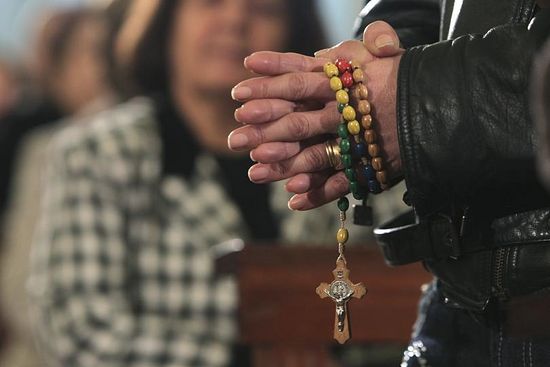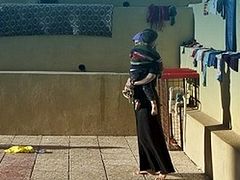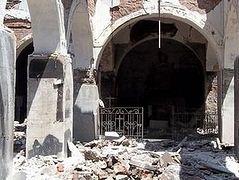Source: International Business Times
Christian populations across much of the conflict-stricken Middle East have rapidly declined in recent decades, and now many church leaders fear their ancient presence in the region could soon disappear, the Economist reported Friday. While Muslims make up the vast majority of victims in the Middle East's wars, minorities have been disproportionately impacted as Christians have seen their numbers dwindle across the region from 14 percent in 1910 to just 4 percent today.
Some have left due to violence, others due to economic unease. Still others complain of a generally hostile environment, including the spread of militant Islamic ideologies. Circumstances of Christian populations vary by country. Palestinian Christians, for example, widely complain Israeli policies — and not Palestinian militant groups — have hurt their communities, causing a massive exodus of Christians from the land that is at the heart of Christianity. For Christmas, hundreds of Palestinians in Gaza were granted rare approval to leave the besieged Palestinian enclave, and many were expected to look beyond Gaza and settle elsewhere. Ten years ago, there were some 3,000 Palestinian Christians in Gaza; today, little more than 1,000 remain.
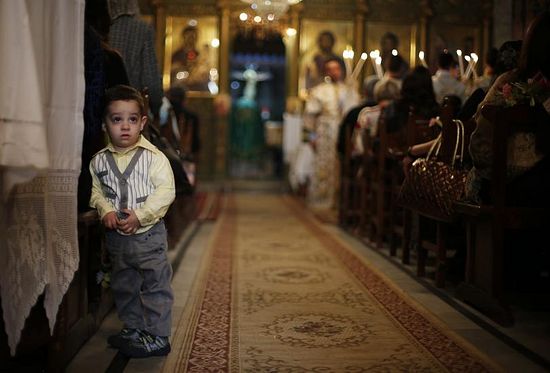 A Palestinian boy attends Orthodox Christian Palm Sunday Mass with his family at the Saint Porfirios church in Gaza City, April 13, 2014.PHOTO: SUHAIB SALEM/REUTERS
A Palestinian boy attends Orthodox Christian Palm Sunday Mass with his family at the Saint Porfirios church in Gaza City, April 13, 2014.PHOTO: SUHAIB SALEM/REUTERS "The blockade is one issue, and also the threat of another Israeli attack," said the Rev. Alex Awad, the former dean of the Bethlehem Bible College in the West Bank, who has worked in Gaza. "Who would want to endure Israeli bombardments in Gaza every 12 months or every two years, to live that nightmare of not knowing whether you are going to live through the bombardment or not?"
Perhaps the country where Christians have seen a most drastic decline recently has been in Syria where five years of war has created an unprecedented refugee crisis. Roughly half of the country of 23 million residents has been displaced, and 250,000 people have been killed, U.N. statistics indicate. With the growth of extremist Muslim groups, including the Islamic State group and al Qaeda's al-Nusra Front, minorities have faced a particular and acute threat. Christians, as well as other minorities, are required to pay a special tax, convert to Islam or leave under ISIS rule.
Democratic presidential candidate Hillary Clinton said earlier this week the killing of Christians and other religious minorities by ISIS constitutes "genocide."
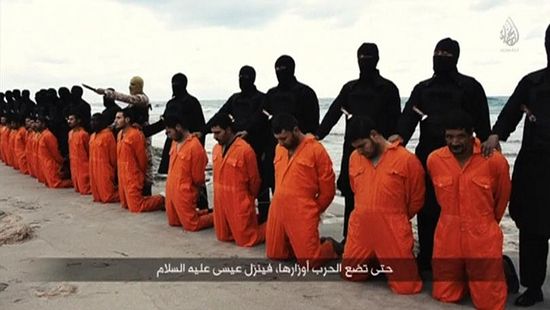 Men in orange jumpsuits purported to be Egyptian Christians held captive by the Islamic State group kneel in front of armed men along a beach said to be near Tripoli, Libya, in this still image from an undated video made available on social media, Feb. 15, 2015.PHOTO: SOCIAL MEDIA VIA REUTERS TV
Men in orange jumpsuits purported to be Egyptian Christians held captive by the Islamic State group kneel in front of armed men along a beach said to be near Tripoli, Libya, in this still image from an undated video made available on social media, Feb. 15, 2015.PHOTO: SOCIAL MEDIA VIA REUTERS TV In many cases, pressure on Christians is caused by perceived political leanings, rather than inherent religious quarrels. In Iraq, where ISIS has recently gained a foothold, Christians were seen to support the Americans in the past, and were targeted by insurgents after the country spiraled into sectarian conflict after the 2003 U.S. invasion. Elsewhere in the Middle East, Christian leaders have often been accused of being too cozy with dictatorial regimes, usually to ensure their own protection. In Syria, for example, Christians have not supported the embattled President Bashar Assad, but have nonetheless been wary of what might come next, a member of the Christian community told the Economist.
 Nuns attend a mass prayer for Orthodox Patriarch of Antioch and All the East Ignatius Hazim IV at the Orthodox Patriarchate in Damascus, Syria, Dec. 10, 2012.PHOTO: KHALED AL-HARIRI/REUTERS
Nuns attend a mass prayer for Orthodox Patriarch of Antioch and All the East Ignatius Hazim IV at the Orthodox Patriarchate in Damascus, Syria, Dec. 10, 2012.PHOTO: KHALED AL-HARIRI/REUTERS While many refugees from countries ravaged by war have settled within the region, taking refuge in neighboring nations, others have gone overseas. Given that much of the Middle East's Christian population has scattered throughout the world, many settling in Western countries in recent decades, Christians often have stronger bonds overseas and more possibilities.
Christians were historically important communities to the fabric of the Middle East, and many feel they still remain so, even as they search to establish roots elsewhere. “Christians are not guests in the Middle East,” Paul Karam, the president of Caritas, a Catholic charity, in Lebanon, told the Economist. “We are the original owners of the land.”
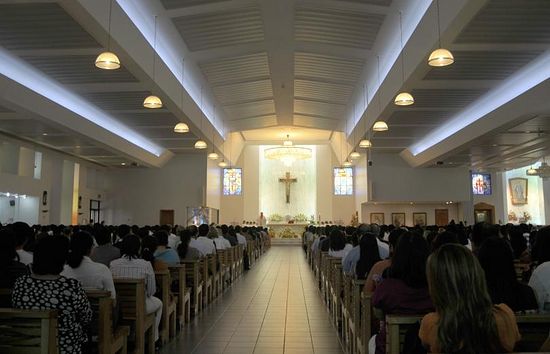 Gulf states are among the few countries in the Middle East where Christian populations have grown. Above, devotees attend Easter Mass at St. Mary's Catholic Church in Dubai, United Arab Emirates, April 4, 2010.PHOTO: JUMANA ELHELOUEH/REUTERS
Gulf states are among the few countries in the Middle East where Christian populations have grown. Above, devotees attend Easter Mass at St. Mary's Catholic Church in Dubai, United Arab Emirates, April 4, 2010.PHOTO: JUMANA ELHELOUEH/REUTERS But there is hope for Christianity in the Middle East. Of the countries mentioned in the report, Saudi Arabia and the United Arab Emirates — notably countries that are not roiled by conflict — have seen growing Christian populations. The level of tolerance in the countries is questionable as public displays of religion other than Islam remain illegal in Saudi Arabia, but a surge in foreign workers has brought in growing numbers of Christians. The United Arab Emirates, where Christians have rights but cannot proselytize, has 40 churches today. That's a big jump from just 24 churches in 2005.

